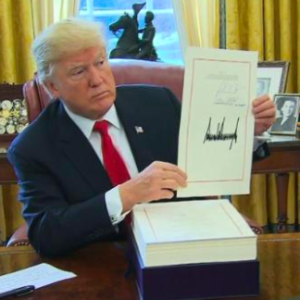For the past seven years, small businesses and our entire economy have benefitted from the lower corporate tax rate and key tax cuts and provisions passed as part of the Tax Cuts and Jobs Act (TCJA) that became law the last time President Trump was in office.
At his speech to a joint session of Congress, President Trump issued an ultimatum to his party to extend and build upon the tax law. It’s time for lawmakers in Congress to work with the White House to build upon the legacy of the 2017 tax law by maintaining current tax rates and extending critical provisions that will otherwise expire at the end of the year. The US economy can only benefit from the certainty small businesses and individual taxpayers would enjoy from such an extension.
The TCJA lowered the tax burden on American businesses of all sizes, reducing the corporate income tax rate from 35 percent to 21 percent and providing a 20 percent deduction on business income for many small-business owners. Along with a range of tax credits and incentives, this fundamentally transformed the business landscape and entire U.S. economy, allowing business owners to expand their operations, create new jobs, invest in new equipment, and give back to their employees and communities.
Without a doubt, the rising tide created by the reforms included in the 2017 tax law did in fact lift all boats, with unemployment dropping to historic lows and wages growing at historic highs in the years since its passage. Lawmakers should be looking to build upon that progress, not undermine it by allowing critical tax cuts to expire or by increasing taxes on American businesses again.
Moreover, as lawmakers work to maintain and strengthen the gains achieved by the 2017 tax reforms, they must also address critical incentives such as the Research and Development (R&D) tax credit and the child tax credit. Cutting-edge innovation lies at the heart of a thriving, globally competitive economy, and the R&D tax credit encourages businesses—especially small and mid-sized firms—to invest in the breakthroughs and advancements that keep us ahead in the global market. In fact, many businesses stand to benefit from a robust R&D tax credit because it helps level the playing field for smaller companies that otherwise might not have the resources to dedicate to research.
At the same time, bolstering the child tax credit is crucial for working families and small-business owners alike, as every dollar saved in taxes frees up resources for groceries, childcare, and education—factors that ultimately influence our workforce participation and productivity for the better. When parents have the flexibility to balance work and family responsibilities, businesses of every size benefit from a more stable labor market.
For lawmakers, that should mean extending TCJA’s most important tax credits while maintaining our current competitive corporate tax rate too. Many small businesses restructured themselves as c-corporations after the 2017 tax law lowered the rate to its current level. Raising the corporate tax rate now would effectively translate to a massive tax increase on Main Street businesses, especially considering nearly three out four c-corps (73.9 percent) have fewer than 10 employees.
It was around this time last year when Congress debated extending parts of the TCJA and, as I said then, allowing these commonsense tax incentives to expire and reverting to the old normal before the TCJA should be unthinkable. Allowing Americans’ taxes to increase by double-digit percentages because of a failure by Congress would create irreparable trust in Washington for the foreseeable future and could cause many to question whether conservatives still believe in the prosperous, nuclear family.
It’s absurd to see prominent conservatives even propose intentional—yes, I said intentional— tax increases on American businesses like raising the corporate tax rate and business SALT deduction. America doesn’t have a tax revenue problem; we have is a spending problem—and it is one that will not be solved with more tax increases on U.S. businesses and working families. As lawmakers debate how to move forward, they should reflect on the positive impact that the Tax Cuts and Jobs Act of 2017 has had on U.S. businesses over the past seven years, particularly for entrepreneurs and small-business owners.
We need our Congress to pass real solutions that benefit entrepreneurs and businesses of all sizes—not just a select few. To do that, lawmakers must negotiate in good faith to secure, protect, and build upon the critical tax reforms passed in 2017. If they fail to act, it will mean higher taxes for all businesses and working families nationwide.

